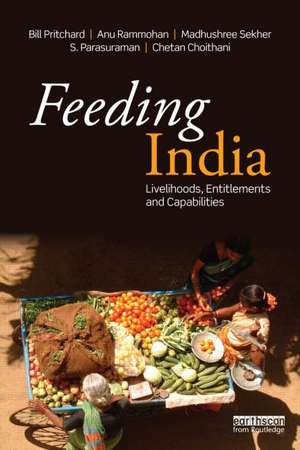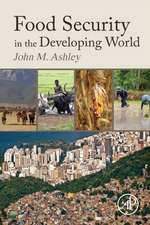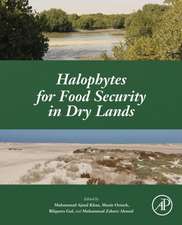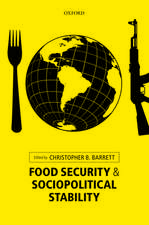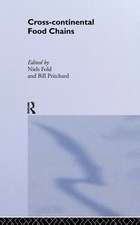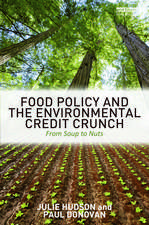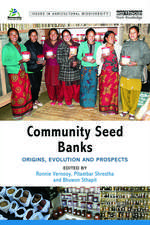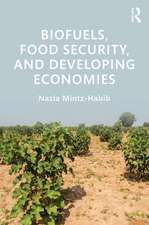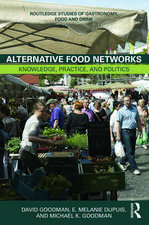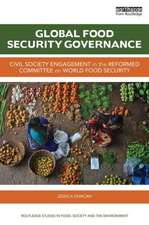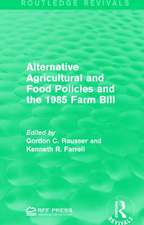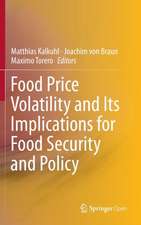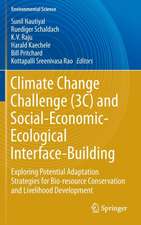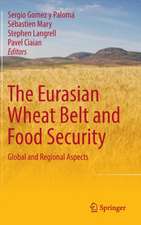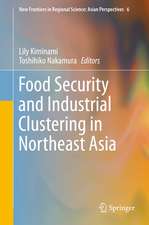Feeding India: Livelihoods, Entitlements and Capabilities
Autor Bill Pritchard, Anu Rammohan, Madhushree Sekher, S. Parasuraman, Chetan Choithanien Limba Engleză Paperback – 9 aug 2013
This book takes on this challenge. It explains how India’s chronic food security problem is a function of a distinctive interaction of economic, political and environmental processes. It contends that under-nutrition and hunger are lagging components of human development in India precisely because the interfaces between these aspects of the food security problem have not been adequately understood in policy-making communities. Only through an integrative approach spanning the social and environmental sciences, are the fuller dimensions of this problem revealed. A well-rounded appreciation of the problem is required, informed by the FAO’s conception of food security as encompassing availability (production), access (distribution) and utilisation (nutritional content), as well as by Amartya Sen’s notions of entitlements and capabilities.
Preț: 442.88 lei
Nou
Puncte Express: 664
Preț estimativ în valută:
84.74€ • 88.95$ • 70.34£
84.74€ • 88.95$ • 70.34£
Carte tipărită la comandă
Livrare economică 10-24 aprilie
Preluare comenzi: 021 569.72.76
Specificații
ISBN-13: 9780415529679
ISBN-10: 0415529670
Pagini: 208
Ilustrații: 30 black & white illustrations, 14 black & white tables
Dimensiuni: 156 x 234 x 14 mm
Greutate: 0.3 kg
Ediția:New.
Editura: Taylor & Francis
Colecția Routledge
Locul publicării:Oxford, United Kingdom
ISBN-10: 0415529670
Pagini: 208
Ilustrații: 30 black & white illustrations, 14 black & white tables
Dimensiuni: 156 x 234 x 14 mm
Greutate: 0.3 kg
Ediția:New.
Editura: Taylor & Francis
Colecția Routledge
Locul publicării:Oxford, United Kingdom
Public țintă
UndergraduateCuprins
1.Introduction 2. The Dynamics of Under-nutrition in India 3. Holding Out the Begging Bowl No More: India as Food Self-sufficient but Food Insecure 4. Food Security through Agriculture-based Livelihood Strategies 5. Food Security through the Non-agricultural Economy 6. Food Security through Social Safety Net Programs 7. India’s Brave New World of Food Security Policy: E-Governance and Cash Transfers 8. Conclusion
Readers should note that the maps of India in this publication do not purport to represent the official borders of India but are used for indicative purposes only.
Readers should note that the maps of India in this publication do not purport to represent the official borders of India but are used for indicative purposes only.
Notă biografică
Bill Pritchard is Associate Professor of Human Geography in the School of Geosciences, University of Sydney.
Anu Rammohan is Professor of Economics in the School of Business, University of Western Australia.
Madhushree Sekher is Professor and Chairperson of the Centre for Social Exclusion and Inclusive Policies, Tata Institute of Social Sciences, Mumbai.
S. Parasuraman is Director, Tata Institute of Social Sciences, Mumbai.
Chetan Choithani is a doctoral candidate in Human Geography in the School of Geosciences, University of Sydney and a holder of the Prime Minister’s Australia-Asia Endeavour Fellowship.
Anu Rammohan is Professor of Economics in the School of Business, University of Western Australia.
Madhushree Sekher is Professor and Chairperson of the Centre for Social Exclusion and Inclusive Policies, Tata Institute of Social Sciences, Mumbai.
S. Parasuraman is Director, Tata Institute of Social Sciences, Mumbai.
Chetan Choithani is a doctoral candidate in Human Geography in the School of Geosciences, University of Sydney and a holder of the Prime Minister’s Australia-Asia Endeavour Fellowship.
Recenzii
"Feeding India is an erudite and cogently argued contribution to resolving India’s great paradox: its inability to combat hunger and malnutrition despite rapid economic growth and satisfactory levels of food production. It suggests many important clues in resolving this paradox: in failing livelihoods for small farmers and farm workers, in the informalisation of non-farm work, in gender inequities and cracks in India’s social protection apparatus." – Shri Harsh Mander, Member, NAC, Government of India
"The persistence of food insecurity is a major challenge for public policy and democratic practice in India. Feeding India presents a clear and insightful account of recent research and debates on this issue. It is a timely and valuable contribution to a better understanding of this momentous subject" – Jean Drèze, Honorary Professor, Delhi School of Economics, India
"The intriguing and immensely important question that motivates this book is: "How can a fast growing country like India have such a large part of its population that is still malnourished?" The scope of the book goes way beyond food and nutrition; it goes to the heart of the development process underway in India and introduces us to the key debates on some crucial policy issues in a lucid and open-minded way. It is a must-read for any serious student of Indian development." – Ashok Kotwal, Professor of Economics, The University of British Columbia, Canada
"This important book shows how and why rapid economic growth in India has not been translated into food security for large numbers of the country's most vulnerable households. The authors convincingly show how food insecurity is not a problem of food production, or even one of food distribution; it is a problem of livelihood insecurity which, in turn, is bound up in the wider social and political structures and fissures that characterise the contemporary Indian political economy. It is thus a sobering book: addressing under-nutrition is proving to be a lot harder than promoting economic growth." – Jonathan Rigg, National University of Singapore
"The persistence of food insecurity is a major challenge for public policy and democratic practice in India. Feeding India presents a clear and insightful account of recent research and debates on this issue. It is a timely and valuable contribution to a better understanding of this momentous subject" – Jean Drèze, Honorary Professor, Delhi School of Economics, India
"The intriguing and immensely important question that motivates this book is: "How can a fast growing country like India have such a large part of its population that is still malnourished?" The scope of the book goes way beyond food and nutrition; it goes to the heart of the development process underway in India and introduces us to the key debates on some crucial policy issues in a lucid and open-minded way. It is a must-read for any serious student of Indian development." – Ashok Kotwal, Professor of Economics, The University of British Columbia, Canada
"This important book shows how and why rapid economic growth in India has not been translated into food security for large numbers of the country's most vulnerable households. The authors convincingly show how food insecurity is not a problem of food production, or even one of food distribution; it is a problem of livelihood insecurity which, in turn, is bound up in the wider social and political structures and fissures that characterise the contemporary Indian political economy. It is thus a sobering book: addressing under-nutrition is proving to be a lot harder than promoting economic growth." – Jonathan Rigg, National University of Singapore
Descriere
Food security is one of the twenty-first century’s key global challenges, and lessons learned from India have particular significance worldwide. This book explains how India’s chronic food security problem is a function of a distinctive interaction of economic, political and environmental processes and lack of understanding in policy-making communities.
